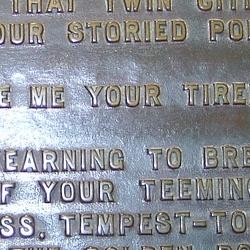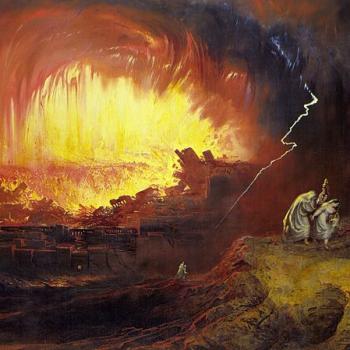
Johann Rottenhammer, “The Resurrection of Christ”
In a recent article in the Washington Post, Jacob Lupfer argues that “doubting the Bible is good for Christians.” Since the article appeared on Good Friday, I suspected that the obligatory yearly scoffing at the Resurrection was afoot. Mr. Lupfer did not disappoint. The secular media is always busy at its charism of instructing Christians on how they really should interpret the Bible. It is not as though we inquire with the Church or anything like that; instead, we look to our prophets in the media.
Mr. Lupfer begins:
As a professional observer of American religion, I am fascinated by how people decide which biblical stories must be understood as literal accounts of historical events and which may be interpreted as mythic, metaphorical or exaggerated.
As a professional observer of American religion, I am fascinated by how people decide which biblical stories must be understood as literal accounts of historical events and which may be interpreted as mythic, metaphorical or exaggerated.
Now one thing that fascinates me about this is that it has nothing at all to do—as Mr. Lupfer’s title proclaims—with doubting the Bible; merely with the right interpretation of it. I can think the Book of Job is fiction without doubting it. It only requires saying Job was never meant to be understood as historical in the first place.
Now one thing that fascinates me about this is that it has nothing at all to do—as Mr. Lupfer’s title proclaims—with doubting the Bible; merely with the right interpretation of it. I can think the Book of Job is fiction without doubting it. It only requires saying Job was never meant to be understood as historical in the first place.
A second thing that fascinates me is the unstated assumption behind Mr. Lupfer’s observation; namely, that the difference between what Christians view as myth and what they view as history is arbitrary. Lupfer does not tell us why he entertains such an assumption; but look at what it leads to:
[P]lenty of Christians interpret at least some biblical material non-literally. Maybe Jesus did not actually walk on water. Maybe the story of Jonah living in a fish’s belly for three days is a myth. Maybe Job was not a historical figure
If these stories are mythical, Mr. Lupfer’s “logic” goes, perhaps the Resurrection is too.
Once you accept the historicity of the resurrection, you already hold the conditions for believing that Jesus walked on water, that he literally fed 5,000 people with only a few loaves and fishes. And perhaps, when this happens, believers stop thinking critically about the Bible and miss out on a lot of the lessons buried beneath the literal stories.
Now, the main problem with all that is that it is a non sequitur. It simply does not follow that if one thing in the Bible is historical, something else may not be mythical. The Bible is a collection of texts written in different cultures over a period of several thousand years; and as such, it contains many different literary genres. This is such a commonplace, such an obvious point for anyone who bothers to look through the table of contents, that it surprises me I have to mention it at all.
For example, since Mr. Lupfer brings it up, let us look at how the Book of Job opens:
1 There was a man in the land of Uz, whose name was Job; and that man was blameless and upright, one who feared God, and turned away from evil.
2 There were born to him seven sons and three daughters.
3 He had seven thousand sheep, three thousand camels, five hundred yoke of oxen, and five hundred she-asses, and very many servants; so that this man was the greatest of all the people of the east.
4 His sons used to go and hold a feast in the house of each on his day; and they would send and invite their three sisters to eat and drink with them.
5 And when the days of the feast had run their course, Job would send and sanctify them, and he would rise early in the morning and offer burnt offerings according to the number of them all; for Job said, “It may be that my sons have sinned, and cursed God in their hearts.” Thus Job did continually.
“There was a man in the land of Uz whose name was Job”: This reads like the standard opening of a fairy tale. It is a once-upon-a-time beginning. By contrast, look at how the Gospel of Luke begins.
Inasmuch as many have undertaken to compile a narrative of the things which have been accomplished among us, just as they were delivered to us by those who from the beginning were eyewitnesses and ministers of the word, it seemed good to me also, having followed all things closely[a] for some time past, to write an orderly account for you, most excellent Theophilus, that you may know the truth concerning the things of which you have been informed. (Luke 1:1-4)
Luke presents his gospel as an historical account. He uses eyewitnesses. It is a very different type of text than the Book of Job. Similarly, the Gospel of Matthew begins with a genealogy; and that signals to us that it is part of historical record. The Gospels are eyewitness accounts.
If Mr. Lupfer wants to know “how people decide which biblical stories are historical, and which mythical, metaphorical or exaggerated,” this is one way you decide: You figure out the genre of writing you are dealing with. It is not, of course, the only way; but it is an important one.
Another way we can know, with respect to the Resurrection, that we are to understand it literally, is that St. Paul in his first letter to the Corinthians tells us that Christianity itself depends upon the Resurrection. “If Christ has not been raised,” he says, “your faith is futile and you are still in your sins” (1 Corinthians 15:17). It matters; there is none of this doubt-is-a-good-thing business from Paul. Christianity, as an historical faith which arose at a particular historical time, depended on an historical event: the Resurrection. If the Resurrection is no more than a myth, then Christianity is no more than a myth.
The problem is that Mr. Lupfer has romanticized his doubt to the point that it has become his religion. He does not believe in Christ so much as he belives in his own doubt. Without doubt, he tells us, a person can not “think critically” about the Bible. I am not sure why. Mr. Lupfer confuses critical thinking with doubt; they are not the same.
“I would prefer a faith,” he says, “that can withstand the most stringent intellectual scrutiny.” Of course Christianity can; for its advocates have had intellects much more profound than either Mr. Lupfer’s or my own. But you will have a difficult time at such scrutiny if doubt is your default position. When doubt is your default position, you always set the bar unreasonably high. Even if you were Thomas and put your finger inside of Christ’s wounds, you could always retreat to a hallucination theory. You shut out any room for faith when you demand that doubt become impossible as a condition for belief.
Thomas was the first to demand the impossibility of doubt regarding the Resurrection of Christ. When Christ then said to him, “Put your finger here, and see my hands; and put out your hand, and place it in my side; do not be faithless, but believing,” Thomas fell down and said, “My Lord and my God.” And Christ replied, “Have you believed because you have seen me? Blessed are those who have not seen and yet believe” (John 20:24-29).
Mr. Lupfer insists that only when he stops worrying about the historicity of the Resurrection can he “think seriously about what it would mean to follow in Christ’s footsteps.” But if we must take Christ’s words to Thomas seriously, walking in His footsteps requires faith; and specifically, faith in the Resurrection even without having seen it. For without the Resurrection, we are still in our sins and our faith is vain.
Doubt as a default position can always set the bar for belief too high. No one could possibly prove the Resurrection, but you can disprove it: Just show me a body. For 2000 years, no one has ever produced a body. It is not faith that requires proof, but doubt.
Mr. Lupfer concludes:
But I will find my way to some church on Easter morning, less as a journalist or scholar and more as a once-and-maybe-future worshiper. I will find my voice exclaiming, “He is risen indeed. Alleluia!” Will I finally believe? Maybe not, but I will silently concede that the resurrection of Jesus Christ is not the craziest thing I ever thought about believing in.
He seems to long for faith so much, even in the midst of all his insistence on the importance of doubt. Such incongruence can only be solved when a person stops having faith in his doubts. Blessed are those who have not seen and have still believed.
He is risen indeed. Hallelujah.
***
Originally published at Catholic Stand, March 28, 2016












